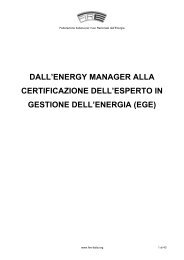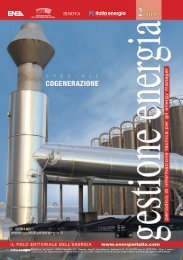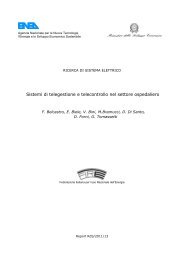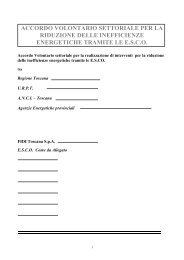part 1: overview of cogeneration and its status in asia - Fire
part 1: overview of cogeneration and its status in asia - Fire
part 1: overview of cogeneration and its status in asia - Fire
You also want an ePaper? Increase the reach of your titles
YUMPU automatically turns print PDFs into web optimized ePapers that Google loves.
Policy framework for promot<strong>in</strong>g <strong>cogeneration</strong> 39<br />
Any lack <strong>of</strong> guarantee for long term availability <strong>of</strong> fuels can lead to higher risks <strong>in</strong> <strong>in</strong>vest<strong>in</strong>g <strong>in</strong><br />
<strong>cogeneration</strong> systems. For example, unlike the developed economies, the availability <strong>of</strong> fuels<br />
<strong>in</strong> most develop<strong>in</strong>g countries depends on the government’s policy changes due to the<br />
monopoly <strong>of</strong> the energy sector. There will be uncerta<strong>in</strong>ties about the actual energy cost<br />
sav<strong>in</strong>gs unless long-term fuel supply is ensured.<br />
A <strong>cogeneration</strong> scheme may be found to be a good f<strong>in</strong>ancial <strong>in</strong>vestment <strong>and</strong> provide<br />
reasonable payback period. The h<strong>in</strong>der<strong>in</strong>g factors however are those which limit the <strong>in</strong>come<br />
derived from the products (heat <strong>and</strong> electricity) or <strong>in</strong>crease the cost <strong>of</strong> <strong>in</strong>puts (equipment <strong>and</strong><br />
fuel). Among these, electricity pric<strong>in</strong>g appears to be the decid<strong>in</strong>g factor that is beyond the<br />
control <strong>of</strong> the cogenerator. Some sort <strong>of</strong> <strong>in</strong>volvement <strong>of</strong> energy companies <strong>and</strong> development<br />
<strong>of</strong> third-<strong>part</strong>y f<strong>in</strong>anc<strong>in</strong>g schemes can help to reduce the f<strong>in</strong>ancial uncerta<strong>in</strong>ties.<br />
In countries where prices <strong>of</strong> other fuels <strong>and</strong> electricity are subsidized, <strong>cogeneration</strong> systems<br />
cannot be f<strong>in</strong>ancially attractive for private or public enterprises if the energy consum<strong>in</strong>g facility<br />
has easy access to the grid or can buy other subsidized fuels. The low rate <strong>of</strong> return on<br />
<strong>in</strong>vestment would not justify the high capital requirement <strong>of</strong> a <strong>cogeneration</strong> system.<br />
Investors may <strong>of</strong>ten look for some form <strong>of</strong> <strong>in</strong>centives such as reduced fuel prices, <strong>in</strong>vestment<br />
subsidy, tax benef<strong>its</strong> <strong>and</strong> attractive tariffs. In countries hav<strong>in</strong>g no or <strong>in</strong>adequate <strong>in</strong>centives,<br />
<strong>cogeneration</strong> development has been found to be low or marg<strong>in</strong>al. In <strong>in</strong>dustrialized countries,<br />
<strong>cogeneration</strong> has been promoted through f<strong>in</strong>ancial <strong>in</strong>centives such as s<strong>of</strong>t loans, subsidies,<br />
tax credit, etc. Experiences show that these f<strong>in</strong>ancial <strong>in</strong>centives are effective tools to<br />
enhance the development <strong>of</strong> <strong>cogeneration</strong> <strong>in</strong> <strong>in</strong>dustries <strong>and</strong> utilities.<br />
4.2.3 Poor <strong>in</strong>stitutional structure <strong>and</strong> <strong>in</strong>adequate regulatory framework<br />
Like other energy efficient technologies, <strong>cogeneration</strong> can be effectively <strong>and</strong> rapidly promoted<br />
by the government <strong>and</strong> appropriate <strong>in</strong>stitutions work<strong>in</strong>g together <strong>in</strong> harmony. Institutional<br />
issues are ma<strong>in</strong>ly related to the seriousness <strong>of</strong> the national authorities <strong>in</strong> promot<strong>in</strong>g<br />
<strong>cogeneration</strong> <strong>in</strong> order to achieve conservation <strong>of</strong> fossil fuels <strong>and</strong> protection <strong>of</strong> the<br />
environment.<br />
In some <strong>in</strong>stances, existence <strong>of</strong> a promotional organization for <strong>cogeneration</strong> has helped to<br />
establish policy measures <strong>and</strong> develop <strong>cogeneration</strong> market. Some develop<strong>in</strong>g countries lack<br />
<strong>in</strong>stitutions or have <strong>in</strong>adequate <strong>in</strong>stitutions to deal with energy <strong>and</strong> environment matters. In<br />
such <strong>in</strong>stances, there are no energy conservation campaigns <strong>and</strong> distribution <strong>of</strong> <strong>in</strong>formation<br />
on energy efficient technology such as <strong>cogeneration</strong>.<br />
Inadequate regulatory framework can set negative example <strong>in</strong> the form <strong>of</strong> poorly planned <strong>and</strong><br />
designed projects. For bigger <strong>cogeneration</strong> projects <strong>in</strong>volv<strong>in</strong>g district heat<strong>in</strong>g/cool<strong>in</strong>g network<br />
<strong>in</strong> city centres or <strong>in</strong>dustrial estates, the need for <strong>in</strong>vestment may be high. When foreign<br />
<strong>in</strong>vestment is <strong>in</strong>volved, the question <strong>of</strong> allocat<strong>in</strong>g sovereign risks <strong>and</strong> guarantee<strong>in</strong>g utility<br />
payment obligations must be resolved. Lack <strong>of</strong> experience <strong>in</strong> plann<strong>in</strong>g <strong>and</strong> lack <strong>of</strong> transparent<br />
power purchase agreement can lead to prolonged process <strong>of</strong> negotiation between the project<br />
developers <strong>and</strong> the concerned authorities, result<strong>in</strong>g <strong>in</strong> unnecessary delays <strong>in</strong> project<br />
implementation <strong>and</strong> f<strong>in</strong>ancial losses to the developers.<br />
Some <strong>of</strong> the regulatory issues concern fulfill<strong>in</strong>g <strong>of</strong> technical requirements, licens<strong>in</strong>g<br />
arrangements, ability to “wheel” (i.e. allow<strong>in</strong>g cogenerators to sell electricity <strong>and</strong> heat directly<br />
to energy consumers, not through utilities), etc. While the pr<strong>in</strong>ciple <strong>of</strong> authorization sounds<br />
reasonable, procedures can be bureaucratic, complex <strong>and</strong> time consum<strong>in</strong>g, thus perceived<br />
as a dis<strong>in</strong>centive for potential cogenerators with little experience <strong>in</strong> the power sector.<br />
It is also important that the government <strong>and</strong> <strong>in</strong>stitutions themselves must be aware <strong>of</strong> the<br />
benef<strong>its</strong> <strong>of</strong> <strong>cogeneration</strong> <strong>in</strong> achiev<strong>in</strong>g higher overall energy efficiency <strong>and</strong> lower emission <strong>of</strong>









